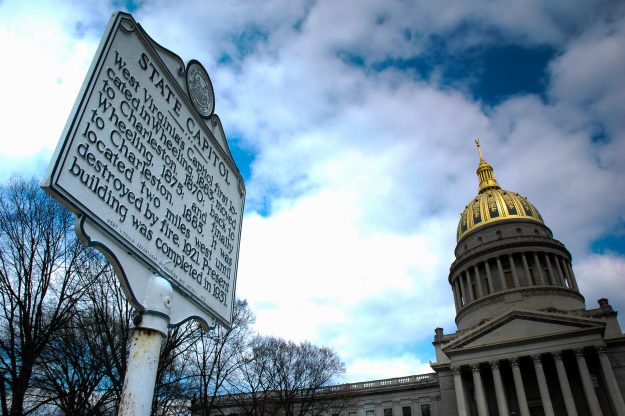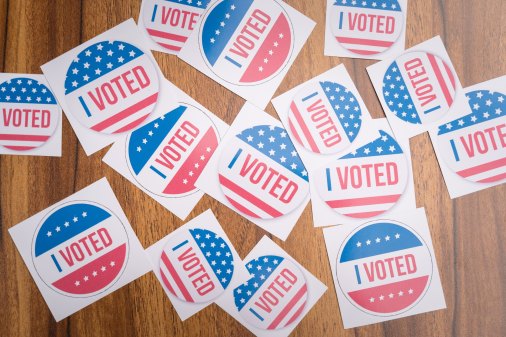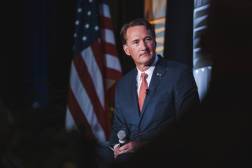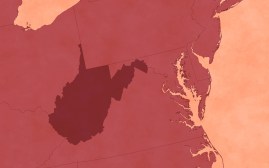West Virginia may offer blockchain-based ballots to all of its overseas voters this November

Two months after West Virginia allowed a small group of overseas voters to participate in the May 8 primary election using online ballots powered by blockchain technology , one of the state’s top election’s officials said on Sunday it could be implemented statewide in time for the general election in November.
If the results of a post-election audit are favorable toward the new technology, which was offered to voters from two counties during the primary, West Virginia will offer all 55 of its counties to participate in blockchain-powered voting, Donald “Deak” Kersey, the state’s elections director, said at the National Association of Secretaries of State conference in Philadelphia.
“We have to wait on the audit,” Kersey said. But if officials get “something that comes back from someone who knows what they’re talking about and says it’s secure,” Kersey said hundreds more voters may have the option to vote using a mobile app instead of sending a paper ballot through international mail.
West Virginia got two of its counties to participate in the primary experiment after being approached by Tusk Montgomery Philanthropies, a New York venture-capital firm with investments in cryptocurrency exchanges and other companies developing distributed ledger platforms. The state had been looking to modernize the way it gets ballots to its registered voters who live abroad, especially military personnel on deployment, but found most electronic-balloting systems too expensive.
Tusk Montgomery agreed to pay for West Virginia to test out a mobile voting app developed by four-year-old Massachusetts firm Voatz . Kersey said his office recruited the elections chiefs in Monongalia and Harrison counties — which have a combined population of about 143,000 — to offer the app to their registered voters not currently residing in the country, including Secretary of State (and Kersey’s boss) Mac Warner’s son, who is an active-duty Army officer.
West Virginia officials have been coy about how many people actually used Voatz’s app during the primary, though a source with knowledge of the project said it was as few as 13. But Kersey sounded confident in the limited sample.
“The factors were it had to be secure, affordable, transparent, auditable and no mail, printer, fax or scanner needed,” he said. “The sailor in the submarine under the polar ice cap doesn’t have access to U.S. Mail, but he does have access to the internet.”
Several steps for authentication
With voters and election officials rattled by discoveries of foreign hackers’ attempts to meddle in the 2016 presidential election, digital voting systems can face a high level of distrust. But both Kersey and Voatz co-founder Nimit Sawhney defended the company’s platform as being highly secure.
A demonstration provided by Sawhney showed that the app goes through several authentication steps, beginning with a six-digit code that’s texted to a user’s phone and has to be entered back into the app. From there, a user is required to upload an image of a government-issued photo and then take a selfie for verification, which takes up to 24 hours, Sawhney said. Once that is complete, a registered user is finally presented with a ballot.
Critics of new voting technologies frequently cite paper-based ballots as the preferred method to ensure trustworthy election results, and are wary of new technologies like blockchain, which is barely a decade old.
“I know as an elections administrator, it raises a lot of red flags,” Kersey said. “But this posed the best options.”
Kersey vouched for Voatz by telling a roomful of secretaries of state and other election officials that Warner and his chief information officer, Dave Tackett, personally toured Voatz’s office outside Boston and examined the company’s computing standards, which it says are set by the National Institute for Standards and Technology and the MITRE Corporation, among other organizations.
Retrieving the actual votes from the app once they’ve been cast is also a bit elaborate. Kersey said Voatz delivered physical security keys — essentially flash drives with de-encryption codes — to the counties that participated in the pilot, with two users of opposite political parties needed to unlock the votes from the company’s server.
“They literally flew from Boston to West Virginia and drove from Morgantown and delivered them to the county clerks,” Kersey said. “The reports are printed and votes are cast. Voters are secret.”
Kersey said that’s an upgrade over other electronic methods overseas voters use to return their ballots. Many Americans voting from abroad who send in their ballots via fax or email are required to sign waivers acknowledging they’re giving up the secrecy of their votes.
Within the next week, Kersey said, his office will decide if it wants to roll out Voatz’s system across the state, though if it does, it will be on a voluntary basis for every county.
“Oh, my god.”
Not everyone who watched Kersey’s presentation was convinced that mobile voting is the way to go.
“Oh, my god,” said J. Alex Halderman, a computer science professor at the University of Michigan who is serving as a technology fellow to Verified Voting, which advocates for ballot security. “Voting over the internet creates extra-difficult problems. Securing servers? Protecting devices? Assuring votes have been recorded while protecting the secret ballot?”
Halderman said that no voting technology developed is as secure as in-person paper ballots. He’s testified before Congress on the subject, and has conducted demonstrations in which he hacked electronic voting machines to change tabulations and, in one case, reprogram a machine to play Pac-Man.
In a recent video he made with the New York Times , Halderman explained how a committed hacker — whether acting alone or on behalf of a foreign government — might pose as an election-equipment manufacturer and email a local election official with a virus masked as a software update.
Voatz, Halderman said, “hasn’t made enough public about how the tech works for outside experts to scrutinize it.”
Sawhney told StateScoop that ballots collected over Voatz can generate paper receipts. He also said that the company’s app will not run if it detects malware on a mobile device, but Halderman was skeptical of that claim. “That sounds like a $1 billion solution,” he said.
Still, Halderman agreed making it easier for U.S. citizens to vote from abroad, especially deployed military, is a worthy goal.
“We should do everything we can to make sure members of the military can vote,” he said. “The biggest thing jurisdictions could do for military voters is to extend their deadlines.” (He also expressed doubt that sailors would be allowed to bring their personal mobile phones aboard a submarine.)
If it works for the Oscars…
But whether it’s through blockchain or another protocol, internet and mobile voting is inevitable, and for more than just overseas voters said James Simmons, the chief executive of Everyone Counts , which makes software for voter registration and digital elections, including some overseas ballots.
Most elections Simmons’s company conducts are for non-government entities, including corporate boards, labor union leadership and awards shows like the Oscars. He said votes are encrypted with private and public keys and transmitted using secure sockets layer and transport layer security protocols back to independent auditors, who tally the actual votes. (The incident at the 2017 Academy Awards in which “La La Land” was mistakenly named Best Picture over the actual winner, “Moonlight,” was the result of an on-stage misreading , though Simmons said he was momentarily worried that his company’s system had failed.)
Simmons did not endorse blockchain or any other specific platform, but he did predict that online voting will spread to the general public.
“One day the world will vote online,” he said. “The technology’s not there yet. It might be a long way off. But like so much else, it will be digitized.”
Even if the the audit of West Virginia’s two-county pilot is positive toward Voatz’s software, West Virginia does not have a particularly large overseas diaspora — the Federal Voting Assistance Program, which facilitates voting from abroad, counted 334 registered voters from the state living in foreign countries in a 2016 survey . Kersey said he expects to hear the results later this month, just before a meeting with election directors in all 55 counties.






